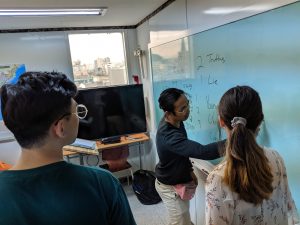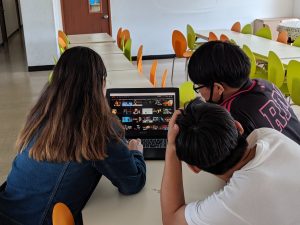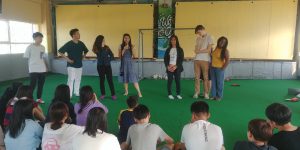Our seventh week in South Korea was the second week at Wooridul School, a special-purpose academy for North Korean defectors and recent arrivals from countries such as China. Each of us were put in charge of our own classes and our own students. The lesson plans were completely up to individual opinion.
I can’t speak much of the experiences of the other teachers — I did not teach with any of them, and didn’t have the chance to speak with their students on the level that they did. However, I do know that everyone has felt deeply for the school, staff, and the students we’ve been so lucky to meet and teach.
I was put in charge of a student named Jae Myeong for the Reading Club period, a Chinese boy who had been in South Korea for the past year but had essentially no English or Korean experience, something I discovered when he stared blankly at me during introductions until I spoke Chinese. The other student that was supposed to join our sessions moved to another class, and I spend an hour every morning guiding him through various alphabet and phonetic-based books. In the span of two weeks, he not only learned the names of the letters, but also can understand the phonetics behind each letter, how to sound out words based on letter combinations, and how to comprehend basic sentences.
Jae Myeong’s motivation and budding confidence in English completely blew my mind. His progress was exponential, and I felt encouraged by the little differences from one day to the next. One day, he couldn’t pronounce the letter r, and the next day he was reading “whisper” out of the book. It was progress unmatched to any student I’ve taught in my life, and I sincerely wish I knew more Chinese to properly convey my wonder to him.
For my normal class, I taught a group of 5 students, aged 17-19, who had arrived from China only a few months prior. In the midst of learning Korean, they were thrown into an English-teaching classroom. Their English proficiencies were relatively similar, but varied enough that one student would finish an assignment in 10 minutes, while the other would need side-by-side explanations.
They had all studied English in China — one girl, MiHye, had studied for 9 years — but didn’t have a listening or speaking ability on par with their reading ability. I tried to speak in several languages during the class (and sometimes used Papago when I was at a loss for words or couldn’t understand a word in Chinese), and I think this helped my students feel more comfortable around me. I was just as much a struggling student of their native language as they were mine.
Compared to Jiguchon, I feel like it was harder to form connections with the students at Wooridul, primarily because of the age difference and preferred method of communication. The children at Jiguchon could simply hug us and play games with us, but the students at Wooridul wanted to converse and get to know us. With language barriers, it was definitely more difficult to converse about more complex topics outside of the classroom.
My biggest regret about teaching at Wooridul is that I wasn’t able to form as deep connections as I wanted. My students wanted to spend each class learning as much English as possible, and I tried to accommodate this by filling each period with countless listening and grammar exercises, intertwined with brief conversations. While I feel like my students definitely got more comfortable with using English, I think I would have rather spent a little more time simply sitting with them and talking about wild topics.
One day, I shifted away from the general English lesson — a listening practice using a scene from the Incredibles — and started a conversation about superpowers and morals as a break. For the remainder of the class, we discussed why we all would want a certain power, the harmful possibilities, and the powers within our reach. For the first time, I saw one of the upper-level English students perk up and discuss his sudden want to be a zombie because “it’s hard for them to die,” and another boy who struggled to stay awake because of his late night working hours lit up to a discussion on time control and his love for the Avengers.
Time control would give them more chances. Time, for these students, is a luxury. They would leave my classes early for their part-time jobs, study at their jobs, and sleep for only three hours a night, just to survive in a country where they lived alone.

Nikki (me), Martin, and Thomas teaching a class to the Korean-learning classes.
It was an honor to meet, teach, and get to know the students at Wooridul School, and I wish them all the success in the future. With their drive, they can conquer the world.
____________________________________________________________________________
We said goodbye to the Jiguchon middle schoolers Monday afternoon. We each received a piece of paper with our pictures and a bunch of signatures from our students. Many expressed their regret that they didn’t get to learn from and speak from everyone, but even so they were grateful for each and every one of us. The students formed a circle around us, and we rotated and said goodbye.

Showing my Jiguchon middle school students English movies.
Oh, middle school. Through teaching these students, I think we have all grown so much as people. To feel the experiential weight of our presence on these kids is a feeling incredibly hard to deal with. We will never really know what they have gone through, and we can’t even begin to comprehend the struggles they will encounter for the rest of their lives. But I hope they will have the courage to face whatever life throws at them, and even if their English level is the exact same as before we came, I hope our impact reaches much further.

Closing ceremony for Jiguchon middle school
____________________________________________________________________________
Jiguchon and Wooridul students, I will miss you very much. 사랑하고 고맙다.
Nikki
Leave a Reply